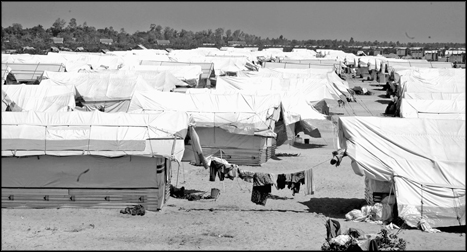Focus on improving education of displaced Muslims
by Mohammed NAALIR
Displacement has severely affected the livelihood and proper
education of Muslims. Greatest attention should be paid to improve the
education standards of the displaced Muslim children, a survey conducted
by All Ceylon Muslim Education Conference revealed.
 It said, the education standards of the Muslims which was at a peak
was brought to zero due to refugee life and the insufficient economy. It said, the education standards of the Muslims which was at a peak
was brought to zero due to refugee life and the insufficient economy.
Even-though they represented only five per cent in the North compared
to the Tamils they were part and parcel in the education and other
sectors.
Unfortunately, the Muslims in the North were ordered by the LTTE to
evacuate their homes and villages in two hours in some areas in Jaffna
and most of other places the deadline to evacuate their villages was 48
hours.
Those who left with empty hands sought refuge in public buildings and
IDP camps depending on the dry rations given by the Government. Due to
this tragic situation the well established education system of Northern
Muslims collapsed.
As there is no more terrorism in this prevailing peaceful situation
the forcibly evicted Muslim community of North got a chance to go back
to their original lands after nearly 20 years.
Before the displacement, the Muslims in the North had their own
educational institutions. Most of the Muslim settlements had formal and
secular educational institutions such as Government and private schools.
Classes were available in those education bodies at various levels from
primary level to GCE (A/L). The Muslim Children of the North received
education in Non-Muslim schools. Muslims of the North benefitted through
formal educational institutions of their own and were able-to upgrade
their standards.
Apart from formal education system there were several informal
educational institutions belonging to Muslims including Islamic
education and Arabic learning institutions.
Displacement caused many negative impacts on the Muslims of the North
including a declining level of education. There were a number of reasons
for the drop of displaced Muslims' education.
The change of the living environment after the displacement, housing
the displaced people in refugee camps in a small area without enough
fundamental facilities and poverty caused due to unemployment among
displaced families were other factors.
At the very outset the displaced persons were housed in public
buildings with the facilities available in the common places. This
situation lasted for several months. The camps were located in isolated
places they were far from the public facilities of schools, hospitals
and other important facilities. As the camps were overcrowded the
students unfortunately missed the chance for education as they were
compelled to obtain education in the nearby schools located close to
their refugee camps.
As the displaced people were depending on Government's dry rations to
feed the family it was insufficient to cater to the entire family. So
the displaced Muslim children were compelled to indulge in labour on a
daily wage basis to meet their daily expenditure. The parents were also
financially weak to meet the cost of their children's education.
 The vicious poverty cycle caused due to the displacement exerted an
immense impact on the education of the displaced Muslim children. The
majority of displaced Muslims are from Puttalam where they have lived
for 17 years. These children received education in schools closer to
their dwellings located in Kalpitiya Divisional Secretariat Division. The vicious poverty cycle caused due to the displacement exerted an
immense impact on the education of the displaced Muslim children. The
majority of displaced Muslims are from Puttalam where they have lived
for 17 years. These children received education in schools closer to
their dwellings located in Kalpitiya Divisional Secretariat Division.
The survey reveals that nearly 60 per cent of the displaced Muslims
are living in the Puttalam District. Thirty per cent of the displaced
Muslim children are getting education in the schools located in Puttalam
Divisional Secretariat Division.
The Government with a view of catering to the education needs of the
displaced Muslim children constructed three schools where a majority of
the displaced Muslims live.
Meanwhile, Resettlement and Disaster Relief Services Minister Rishad
Badiudeen also opened five schools up to grade five in places where the
majority of displaced Muslims live.
The displaced Muslim Children in Anuradhapura, Kurunegala and other
districts are in a disadvantageous position as they live away from
towns.
According to the survey 240 displaced Muslim children have stopped
education in Alankuda area in Kalpitiya.Vacancies prevail for 500
teachers, according to the student-teacher ratio only 240 teacher
appointments have been made in Puttalam District where most of the
teacher vacancies are found in primary classes.
|

